I drove a $43,000 Toyota Camry and saw how the best-selling car in America is now even better
Benjamin Zhang

- The Toyota Camry is a midsize sedan and the best-selling car in the US for the past 22 years.
- I was impressed by the Camry's efficient hybrid powertrain, comfortable ride, and great cabin.
Since its launch in 1983, the Toyota Camry has become the gold standard for dependable, albeit a bit dull, family transportation among American car buyers.
Last year, Toyota sold more than 290,000 Camrys in the US, beating out rivals like the Honda Accord, Hyundai Sonata, and Kia K5. It marked the 22nd year the midsize sedan has been the country's best-selling passenger car.
This year, Toyota went hybrid-only with the Camry, which features updated styling and tech, too.
I recently spent a week driving a 2025 Toyota Camry XSE around suburban Atlanta.
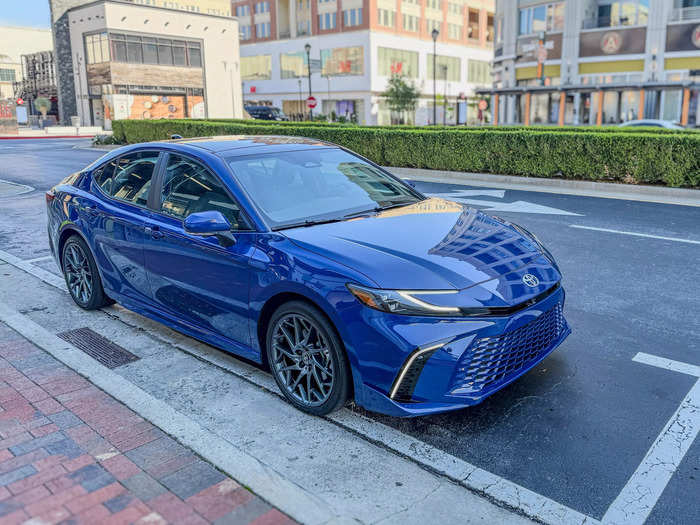
I was impressed by the new Camry's smooth standard hybrid powertrain, fuel efficiency, comfortable ride, updated tech, and well-designed cabin.
There isn't a whole lot wrong with the Camry. Still, I do lament the loss of the outgoing model's powerful V6 engine and that some safety tech is only available as pricey optional extras, even on the top trim levels.
My test car came to $43,194.
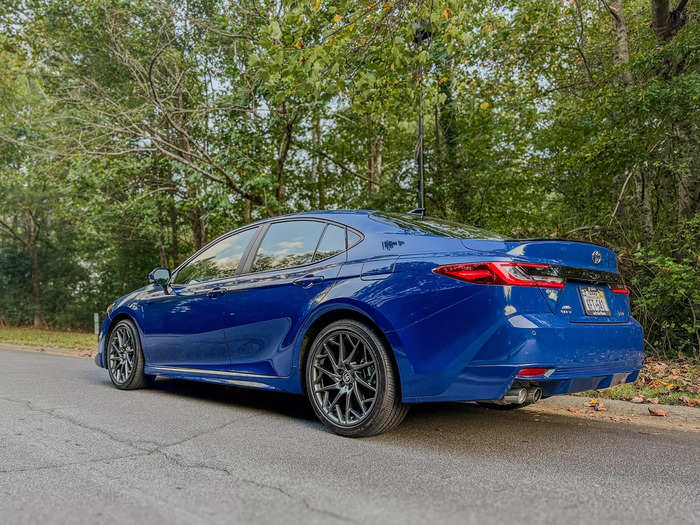
The base front-wheel-drive Toyota Camry LE starts at $28,400, while my top-of-the-line Camry XSE AWD test car starts at $36,125.
Freight fees and a handful of pricey optional tech, styling, and luxury features pushed the as-tested price for the Kentucky-built sedan to more than $43,000.
The new ninth-generation Camry gets updated styling courtesy of Toyota's US design team.
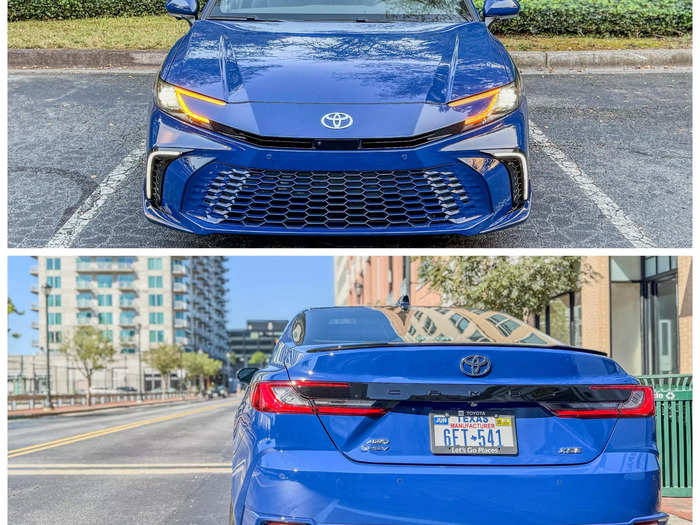
The new Camry's styling is evolutionary rather than revolutionary, continuing Toyota's decision toward more angular and aggressive lines in recent iterations of the sedan.
The ninth-generation Camry, styled by Toyota's design studios in California and Michigan, features the brand's distinctive hammerhead front end, also found on the Prius and the Crown Signia SUV.
The overall look of the Camry is attractive and a far cry from the anonymous design that plagued earlier generations of the model.
The XSE trim comes with a sportier styling.
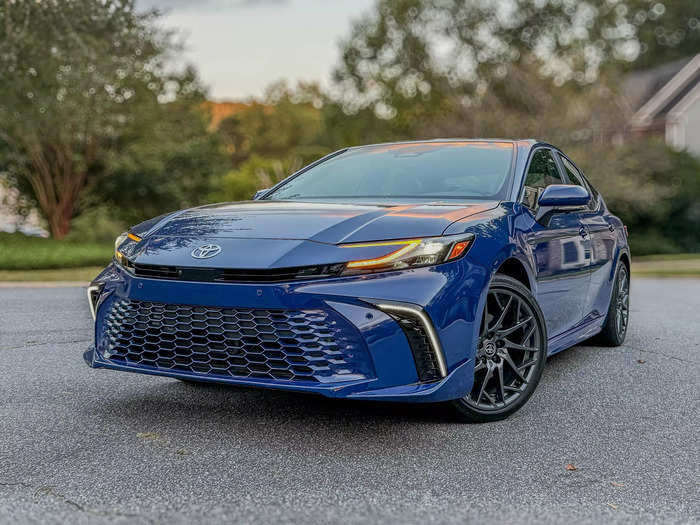
The XSE and mid-grade SE trims are the Camry's "sport" models. As a result, they come with special aerodynamic features, including functional front air ducts, front-side canards, and a rear diffuser.
My test car came with attractive 19-inch dark grey metallic wheels, which are a $1,500 option.
The new Camry is about an inch longer than the vehicle it replaced.
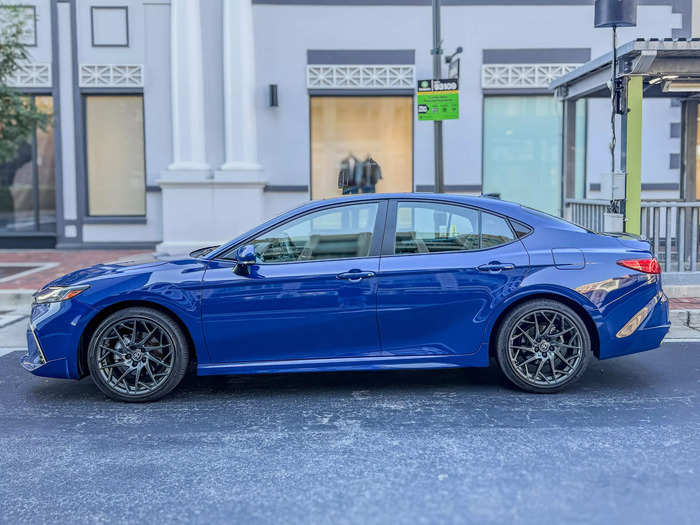
The 2025 Camry rides on Toyota's TNGA-K, which also underpins its predecessor and the Lexus ES sedan. At 193.5 inches, the Camry is the same length as the Hyundai Sonata and about two inches shorter than the Honda Accord.
The Camry's only engine option is a 2.5 four-cylinder engine paired with Toyota's hybrid system.
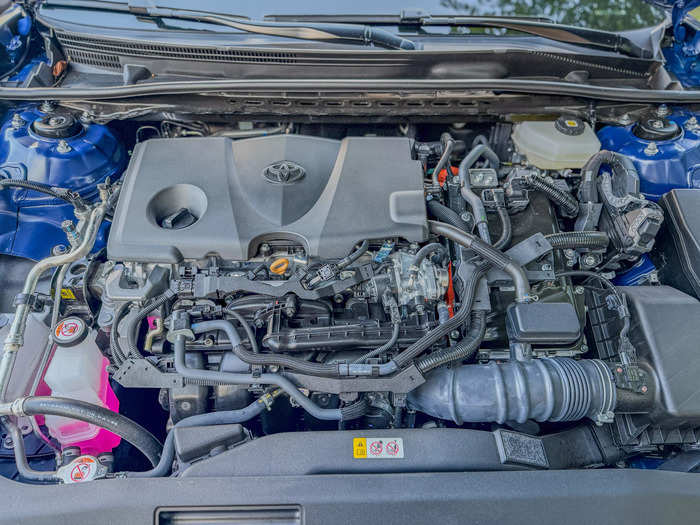
Last year's ICE four-cylinder and V6 engine options are no more.
All Camrys now come standard with the Japanese automaker's tried and tested hybrid system under the hood. The Camry's fifth generation Toyota hybrid power unit consists of a 184 horsepower, 2.5-liter naturally aspirated four-cylinder engine mated to a 134 horsepower electric traction motor and a lithium-ion battery pack.
The total system output is 225 horsepower sent to the front wheels through an electronically controlled continuously variable transmission.
All-wheel-drive models like my test car have a 40 horsepower electric motor mounted to the rear axle, which boosts total output to 232 horsepower.
My all-wheel-drive Camry XSE test car boasted EPA fuel economy figures of 44 mpg city, 43 mpg highway, and 44 mpg combined.
I managed to get within a couple of mpgs of the EPA's combined fuel economy estimates, which is pretty impressive for a 3,700-lbs sedan that was driven quite aggressively.
If you value fuel economy, consider the base front-wheel-drive Camry LE, which is rated for a Prius-esque 51mpg in combined driving.
Despite its sporty looks, the Camry's specialty is still your daily commute.
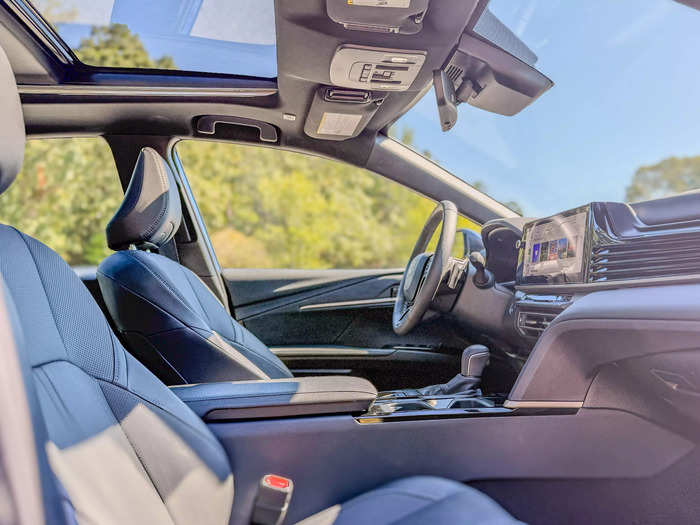
Despite the sporting pretensions of the XSE trim that include a firmer performance-tuned suspension, the Camry is not a sports car.
The Camry's ride is quiet and compliant.
Thanks to its electric motors, the 232 horsepower hybrid system delivers smooth and spirited acceleration off the line.
Even under hard acceleration, the hybrid system remains up to the task with more than enough juice for on ramps and highway passing.
The four-cylinder does emit a mild drone in protest when you gun the throttle, but it's not intrusive enough to detract from the driving experience.
As much as I like the smooth hybrid-electric powertrain, I do miss the tire-chirping muscle of the previous generation's 301 horsepower, V6 engine.
According to Motor Trend, the hybrid 2025 Camry with all-wheel drive can make the run from 0-60 mph in a respectable 6.8 seconds. But that's still a full second slower than the old V6.
The Camry's cabin is thoughtfully designed with great quality.
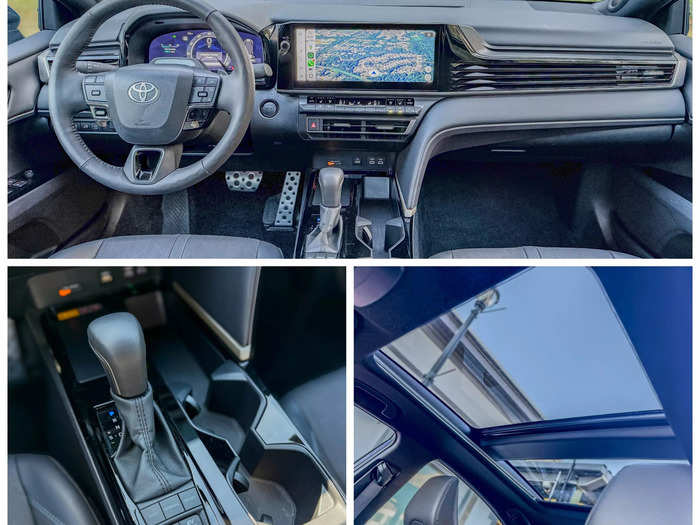
The Camry interior tradtional Toyota. It's well-designed with impeccable ergonomics and plenty of storage and charging options. There's a good mix of physical and touchcontrols that make on-the-fly use a piece of cake.
Material and build quality are both excellent with plenty of soft-touch materials strategically placed in high contact areas.
The Camry's leather front seats are supportive and with good adjustability.
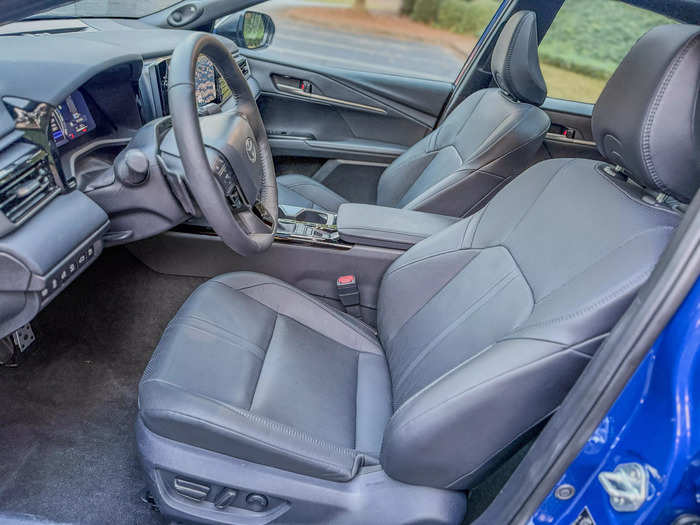
Although, I think the driver's seat could use a bit more thigh support.
In front of the driver is a heated leather steering wheel with paddle shifters.
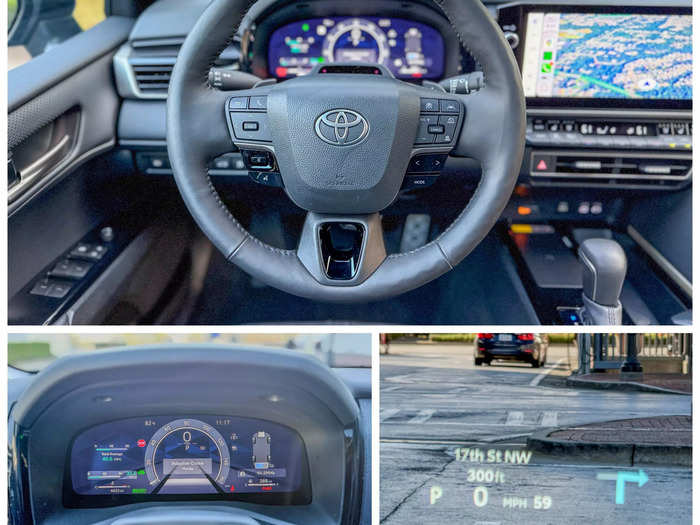
There is also a configurable 12.3-digital gauge cluster that's only available on the XLE and XSE trims. My test car also came with the optional 10-inch color head-up display.
Atop the Camry's center stack is a 12.3-inch infotainment touchscreen.
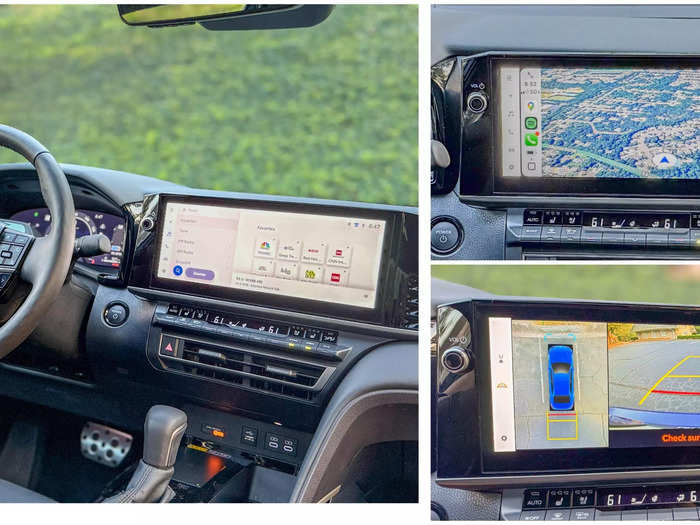
The Camry comes standard with an 8-inch touchscreen, but my test car had the fancier 12.3-inch unit. The Camry's infotainment system is pretty well sorted and fairly intuitive to use.
Wireless Apple CarPlay and Android Auto are standard on all trims.
My test car also came with an optional 360-degree panoramic view camera system.
The Camry's rear seat is spacious and comfortable.
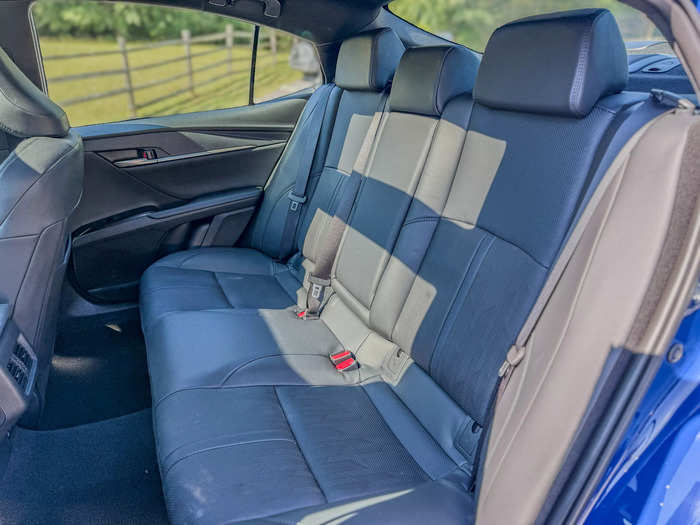
The Camry's rears seats offer 38 inches of legroom, which splits the difference between the roomier Accord and the smaller Sonata.
Behind the rear seats is a 15.1 cubic foot trunk.
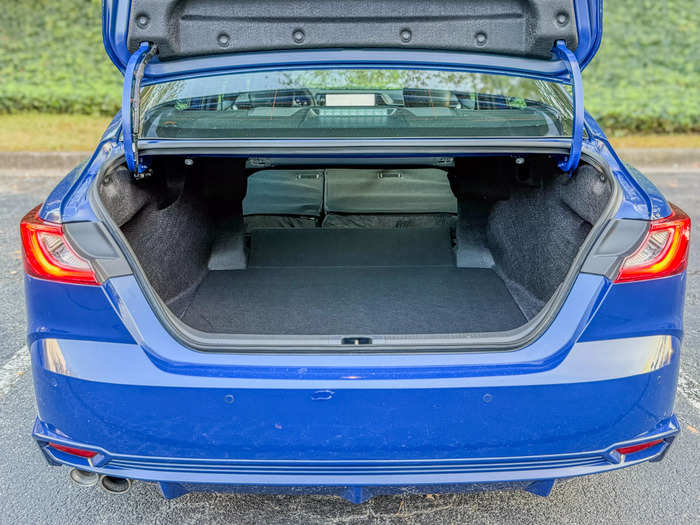
The Camry's trunk is half a cubic foot smaller than the Sonata and 1.6 cubic feet smaller than the Accord.
Under the trunk's cargo floor is the Camry's spare tire.
The Camry comes standard with the latest Toyota Safety Sense 3.0 suite of driver assistance tech.
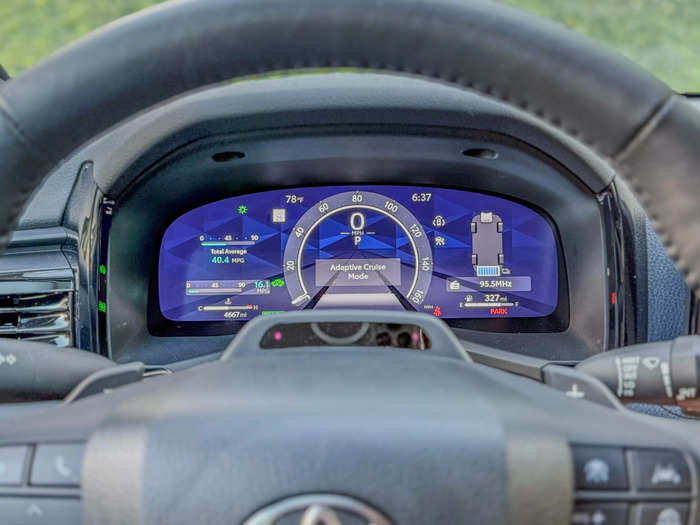
Safety Sense comes standard with important features like adaptive cruise control and lane departure alert. However, features like front and rear cross-traffic alert are available only as part of pricey convenience packages, even on the highest trim.
My verdict: The best-selling car in America is better than ever.
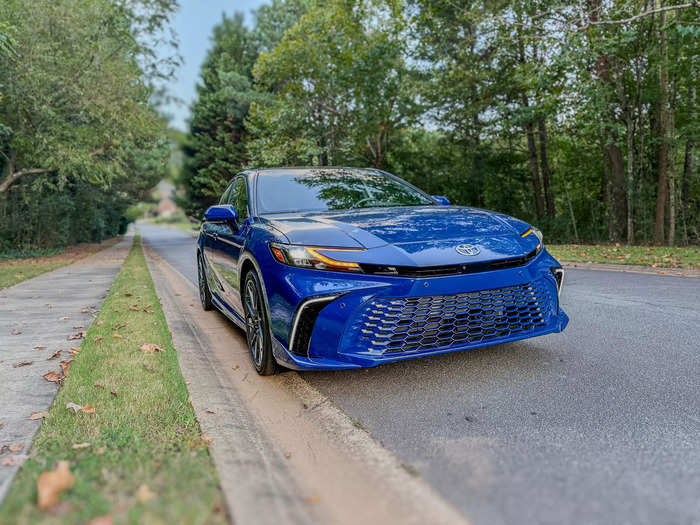
With the marketplace dominated by SUVs and the headlines by EVs, it's easy to overlook traditional midsize family sedans like the Toyota Camry.
But that would be a mistake.
The Camry has so much to offer consumer from its quiet and comfortable cabin to its efficient hybrid drivetrain, and updated tech.
For the past 22 years, the Camry has been America's best selling car - and that streak doesn't appear to be ending anytime soon.
Popular Right Now
Popular Keywords
Advertisement